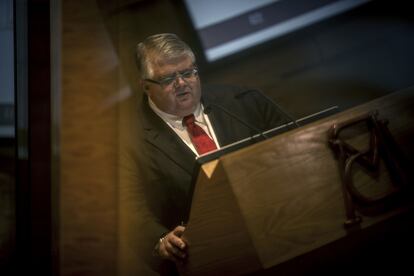Central banks warn that inflation may pick up: ‘This is not the end of the journey’
Agustín Carstens, the general manager of the Bank for International Settlements, called on governments to reign in fiscal policy: ‘The time has come to tighten belts’

The world’s biggest central banks once again captured the markets’ attention this week. Investors are not expecting any moves from either Frankfurt or Washington, but they are waiting to hear the tone of their speeches. No one doubts that interest rates will fall this year. The question is when. Agustín Carstens, the general manager of the Bank for International Settlements (BIS) — which is owned by member central banks —, admitted on Monday that “the end of this exceptional tightening is in sight.” But he warned: “This is not the end of the journey.” At a conference in Basel in Switzerland, Carstens warned of the risks that could cause inflation to rise, such as geopolitical tensions and governments’ resistance to withdraw fiscal stimuli.
In the last two years, central banks have carried out “the largest and most synchronized global monetary policy in a generation,” he said. Central banks are so far pleased with the outcome: developed economies began 2022 with inflation at 7.5% and managed to reduce it to 3.2% by the end of the year. Furthermore, the forecasts of international organizations indicate that economic activity has remained resilient, and that a soft-landing is within reach. “If that is true, the fight against inflation has come at a remarkably small cost in terms of lower GDP growth or higher unemployment,” said Carstens.
The BIS general manager said the current situation allowed for “cautious optimism” about the future. To begin with, one of central bankers’ main fears has not materialized. “So far we are not seeing evidence of wage-price spirals unfolding,” he argued.
According to Carstens, this indicates households and businesses have not yet started to build an assumption of ongoing high inflation into their consumption decisions — an outcome he attributed to the work of the central banks.
In his forecast, the BIS managing director said the economic slowdown would only have a “modest” on the labor market, and that productivity would improve. Central banks also have a tool to cushion the deterioration in labor market conditions: returning interest rates to their appropriate levels in the long term.
However, the central bank coordinator warned that “the last mile” could be “the hardest.” The Mexican economist warned of the disastrous effects that the Middle East crisis could have on the battle against inflation, especially for commodity markets and global trade flows. Carstens recalled that disinflation has gone hand in hand with normalization of global supply chains. But with the Houthis targeting ships on the Red Sea route, container shipping costs have doubled since September, he said.
In addition to geopolitical factors, Carstens pointed to two other risks: deglobalization and demographics. According to the economist, these forces have been intensifying.
The BIS general manager also warned that government still need to tighten the fiscal deficits that were widened during the Covid-19 pandemic to save companies and jobs, and protect the most vulnerable population from the rise in energy prices. “While central banks have done their job by tightening monetary policy and restraining aggregate demand, the same cannot be said for fiscal policy,” he said. “The time has come to tighten belts.“ He added: “This is not a new message. But we have reached the point where fiscal consolidation is an imperative.”
Finally, Carstens listed two other possible dangers. Firstly, that the rise in interest rates — the effect of which has not yet been fully felt — will have a greater impact on economic growth and financial stability. This could have consequences for business investment and household consumption, which would put at risk the resilience that has been observed until now.
The other danger, according to Carstens, is that central banks succumb to market pressures and ease financial conditions prematurely. But the economist said he does not believe Frankfurt, Washington or London have any intention of increasing inflationary pressures. “Central banks will do their job and remain vigilant,” said Carstens, who warned that central banks “may decide to keep interest rates as high as needed or even do more.”
Sign up for our weekly newsletter to get more English-language news coverage from EL PAÍS USA Edition
Tu suscripción se está usando en otro dispositivo
¿Quieres añadir otro usuario a tu suscripción?
Si continúas leyendo en este dispositivo, no se podrá leer en el otro.
FlechaTu suscripción se está usando en otro dispositivo y solo puedes acceder a EL PAÍS desde un dispositivo a la vez.
Si quieres compartir tu cuenta, cambia tu suscripción a la modalidad Premium, así podrás añadir otro usuario. Cada uno accederá con su propia cuenta de email, lo que os permitirá personalizar vuestra experiencia en EL PAÍS.
¿Tienes una suscripción de empresa? Accede aquí para contratar más cuentas.
En el caso de no saber quién está usando tu cuenta, te recomendamos cambiar tu contraseña aquí.
Si decides continuar compartiendo tu cuenta, este mensaje se mostrará en tu dispositivo y en el de la otra persona que está usando tu cuenta de forma indefinida, afectando a tu experiencia de lectura. Puedes consultar aquí los términos y condiciones de la suscripción digital.









































